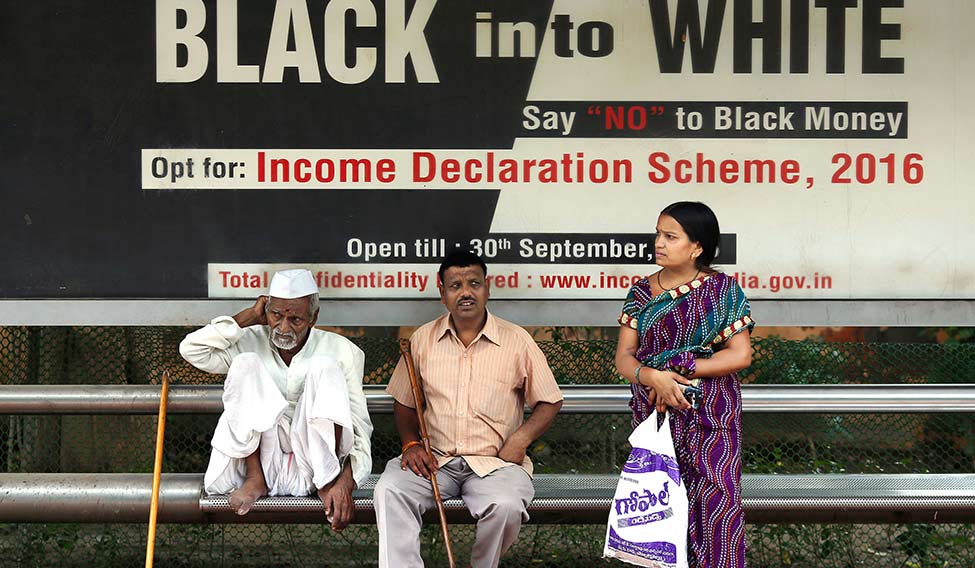Revenue secretary Hasmukh Adhia had been a man in a hurry in the past two weeks. The responsibility of making the Income Declaration Scheme—the Narendra Modi government’s war on black money hoarded in India—a success lay entirely on him. A workaholic, Adhia, along with fellow tax officials, sat up nights before the IDS deadline on September 30, wading through the applications and getting ready with final figures.
While the Rs 65,250 crore declared under the scheme might not be a huge amount, it certainly has beaten expectations of the government and analysts. There are mixed views among chartered accountants and tax experts, but a majority of them feel that the scheme has been successful. “We were not expecting it to sail through well but it has been successful keeping in view the present circumstances. The availability of cash has gone down and property prices are on a downhill. To disclose the undeclared income, that much amount has to be made available. Mostly people sell property to meet that need but even that is down,” said Krishan Malhotra, partner at Dhruva Advisors, a tax planner.
There is no exact figure on the quantum of undisclosed income in India. In a report titled India’s Battle With Black Money, Ambit Capital has pegged it at $460 billion, which is more than the GDP of countries like Thailand and Argentina. “Recent data released by the income tax department show that only 1 per cent of Indians paid taxes in FY 13. Moreover, 80 per cent of all taxes were paid by top 11 per cent of the individuals. India’s remarkably narrow tax base points to the extent of tax evasion that takes place in India. As of today, India’s black economy is equivalent to 20 per cent of the size of India’s GDP,” said the report.
The scheme naturally drew comparisons with the Voluntary Disclosure of Income Scheme (VDIS) of 1997. Financial planner Pankaaj Maalde said in comparison the IDS was not commensurate with the inflation and time lapse. “In the 19 years since then, the black economy would have grown multiple times and so would the undisclosed income. So, I think this is just a tip of the iceberg,” he said.
The income declared under VDIS was Rs 33,000 crore. Of this, around Rs 10,000 crore went to the government as tax. In IDS, the tax and penalty accrued to the government is Rs 31,250 crore. The revenue will go to the consolidated fund of India to be spent on infrastructure.
The IDS was announced in Budget 2016. As per the relaxed requirements, those who disclosed income have to pay a minimum 25 per cent of the tax by November 30, the next 25 per cent by March next year and the remaining by September 30. They have been charged at 45 per cent (30 per cent tax + 7.5 per cent Krishi Kalyan surcharge + 7.5 per cent penalty). In VDIS, the tax payable on the declared amount was at 35 per cent in the case of companies and firms, and 30 per cent in the case of others. The scheme attracted 4.75 lakh declarations as compared with 64,275 under the IDS.
“One of the reasons for lower disclosure is that this time the tax was steep,” said chartered accountant Rajesh M. Kayal. “Many people would not have wanted to disclose their income by paying such a high tax. Under the 1997 scheme, it was more reasonable and they also allowed back-dated market value for assets. That was why the number of declarations was more.”
Also, the tax department has not been able to instil faith among defaulters to come clean. Defaulters did not trust the immunity clauses and feared future scrutiny by tax officials. After the 1997 scheme, a clutch of chartered accountants went to the Supreme Court against treating tax defaulters on a par with honest tax payers. The Supreme Court asked the government to stop offering ‘amnesty schemes’, as such schemes demoralised honest taxpayers and gave tax evaders an opportunity to get away by paying a penalty.
“The fact that we achieved this number despite a 45 per cent tax rate is quite commendable. The department is maintaining full secrecy on names, sectors, cities that have participated in the IDS,” said Mantu Kumar Das, deputy commissioner of income tax, Mumbai.
Though there is no data revealed on the profiles of people who disclosed income under the IDS, sources say that it would be mostly businessmen, real estate tycoons, traders, and professionals such as doctors, lawyers and actors.
What prodded the declarants into disclosing income was the fear of the income tax department actively tracing defaulters. The department has sent some seven lakh letters to tax evaders. The capability of the department to detect tax evasion has improved because of the better access to information and the availability of technology-driven analytical tools. And, by 2018, most countries will have automatic information exchange in place and it would make it easy to trace cash that is stashed in another country.







